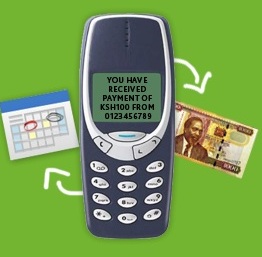Last week, the Nominet Trust included us in their top 100 social innovations list. A little over a month before, Frontline celebrated its 9th birthday, making us one of the older initiatives to receive recognition. But you know what? Nominet is right on time.
FrontlineSMSat7: Mobile Money made easy and accessible
In the sixth of our seven blog posts celebrating the month that FrontlineSMS turns 7, Enock Musyoka, our FrontlineSMS: Credit Project Assistant, shares the impact FrontlineSMS:Credit's PaymentView has on Nunguni Financial Service Association and its members. The power of owning a mobile phone is beyond SMS messages; PaymentView makes it easier to manage payment plans.
FrontlineSMS case study featured in new Rockefeller Foundation report: Learning from experimentation
The Rockefeller Foundation recently launched a new website, Capacity to Innovate.org, which examines lessons from a number of organizations including Ushahidi and Internews, and encapsulates them in three short reports which are well worth a read. FrontlineSMS is featured in the 'Learning From Experimentation' report, available from the website. Here's an excerpt, but we really recommend the whole report as a very readable and thought-provoking set of examples.
In Kenya, microfinance is going mobile - Part 2
The FrontlineSMS:Credit team was recently interviewed by Claire Penicaud at the GSMA MMU about the challenges that Micro Financing Institutions (MFI) face when thinking about adopting mobile money. The FrontlineSMS:Credit team described the challenges they see MFIs in Kenya facing and gave the following pieces of advice to MFIs who are ready to integrate mobile money into their systems.
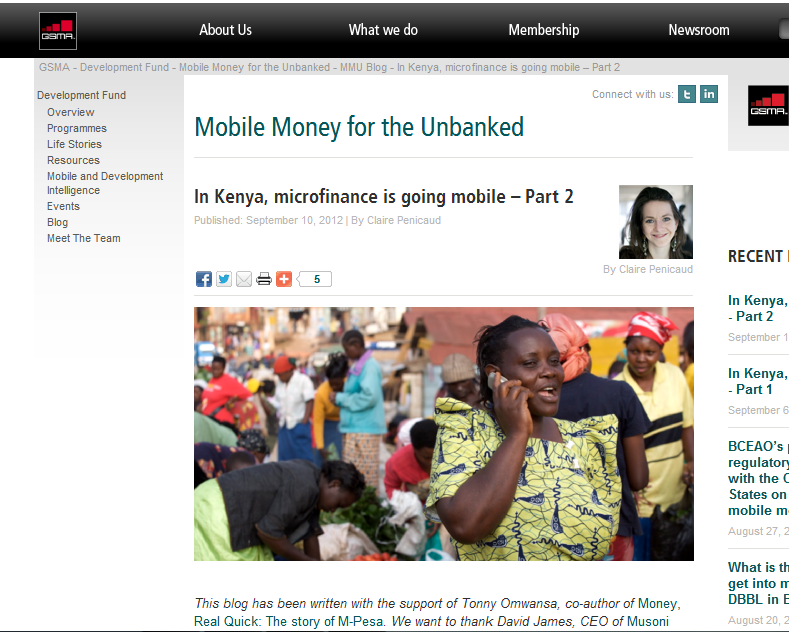
FrontlineSMS
FrontlineSMS:Credit enables organizations that serve the base of the economic pyramid to bring the benefits of mobile money to the financially excluded by building and distributing free, open-source software for mobile money management.
FrontlineSMS:Credit’s PaymentView software is an extension of FrontlineSMS’s free, open-source technology that turns a laptop and a mobile phone or GSM modem into a central SMS communications hub. The tool enables users to send and receive text messages with large groups of people without the need for Internet access. With thePaymentView extension, users can also send, receive, and manage mobile money transactions. By expanding the uses of mobile money in developing markets, FrontlineSMS:Credit helps to fulfill the promise of mobile money to offer even the most underserved communities access to financial services and enable new business models that aid in development.
A lot has happened since we last talked to the FrontlineSMS: Credit team. In a previous blog post, we described their approach towards enabling organizations and businesses to easily use mobile money. Over the past few months, they’ve got the opportunity to test this approach through a project in partnership with a Kenyan financial services association (FSA) [1].
Challenge #1: Providing an easy and convenient way for groups to transfer money to the FSA…
This FSA is composed of 50 groups of around 20 people each. Like many others, it serves a large geographical area and some groups are more than 30km away from the FSA head office. This means that a representative of each group has to travel there every time the group wants to transfer money: which represents a day of travel for the representative of the group and a cost of around USD8 for the group on a monthly basis. The service implemented by FrontlineSMS: Credit allows representatives of groups to transfer money through M-Pesa directly to the FSA. FrontlineSMS estimates that there has been a reduction of up to 50% in the cost of repaying loans and a reduction of up to 85% in the time spent on repayments, depending on how far away a savings group meets from the FSA office. The groups saving the most are those who are far away from the FSA, as almost every group meets within a short walking distance of an M-Pesa agent.
Read the full post on the GSMA website.
Josana Academy Becomes the First School to Use PaymentView
Last week, the FrontlineSMS:Credit team returned to one of our favorite cities in Kenya, Kisumu. This time around we were ready to install PaymentView at Josana Academy and Safe Water and AIDS Project (SWAP). Josana Academy is the very first school using PaymentView, and SWAP is the first organization to make use of PaymentView’s “Targets” functionality (more on that later). PaymentView is a prototype based on version 1 of FrontlineSMS – we are currently looking at building this functionality, with improvements, onto Version 2. More on that in a future post.
![Arriving_at_Kisumu_airport[1]](http://static1.squarespace.com/static/56e1a99907eaa0941d037b0a/56e1aa9e06dcb7bbf42a70ce/56e1aadd06dcb7bbf42a780b/1457629917642/Arriving_at_Kisumu_airport1.jpg?format=original) Our first visit was to Josana Academy, where we met the head teacher, secretary, bursar, and IT support person. The first step was to install PaymentView on the secretary’s computer, as she will be the primary user. Next, we trained the secretary, bursar, and IT support person on how to use the software. Josana Academy will be using PaymentView to enable easier processing of fee payments made via mobile money. Josana is a private primary school, so fees are collected every term. Currently, parents who live far from school and/or cannot easily access a bank branch will ask the school if they can pay via M-Pesa. These payments are either received by the secretary or bursar, or they are received by a child’s classroom teacher. Once a payment is received, the receiver must go into town to cash out and then deposit the money into the bank. PaymentView will streamline this process by enabling all payments to go to one, centralized place. This new process minimizes the number of trips to town made by the secretary or bursar, and prevents teachers from having to make trips to M-Pesa agents for withdrawal.
Our first visit was to Josana Academy, where we met the head teacher, secretary, bursar, and IT support person. The first step was to install PaymentView on the secretary’s computer, as she will be the primary user. Next, we trained the secretary, bursar, and IT support person on how to use the software. Josana Academy will be using PaymentView to enable easier processing of fee payments made via mobile money. Josana is a private primary school, so fees are collected every term. Currently, parents who live far from school and/or cannot easily access a bank branch will ask the school if they can pay via M-Pesa. These payments are either received by the secretary or bursar, or they are received by a child’s classroom teacher. Once a payment is received, the receiver must go into town to cash out and then deposit the money into the bank. PaymentView will streamline this process by enabling all payments to go to one, centralized place. This new process minimizes the number of trips to town made by the secretary or bursar, and prevents teachers from having to make trips to M-Pesa agents for withdrawal.
Josana Academy will also use PaymentView to send out notices to parents via SMS. The current process is time-consuming, as the secretary, must type up a notice and print out copies for all 477 students at the school. She normally prints multiple notices on the same sheet and must then cut the pages into multiple small sheets. The students are responsible for bringing the notices home to parents, and, as we imagine happens in every school in the world, notices are left behind or lost and never reach parents. By sending out notices via SMS directly to parents, Josana Academy can ensure that parents are receiving important messages, while saving the school time, money and resources.
Read more here.
FrontlineSMS:Credit takes on Kisumu
By Enock Musyoka, Project Assistant, FrontlineSMS: Credit
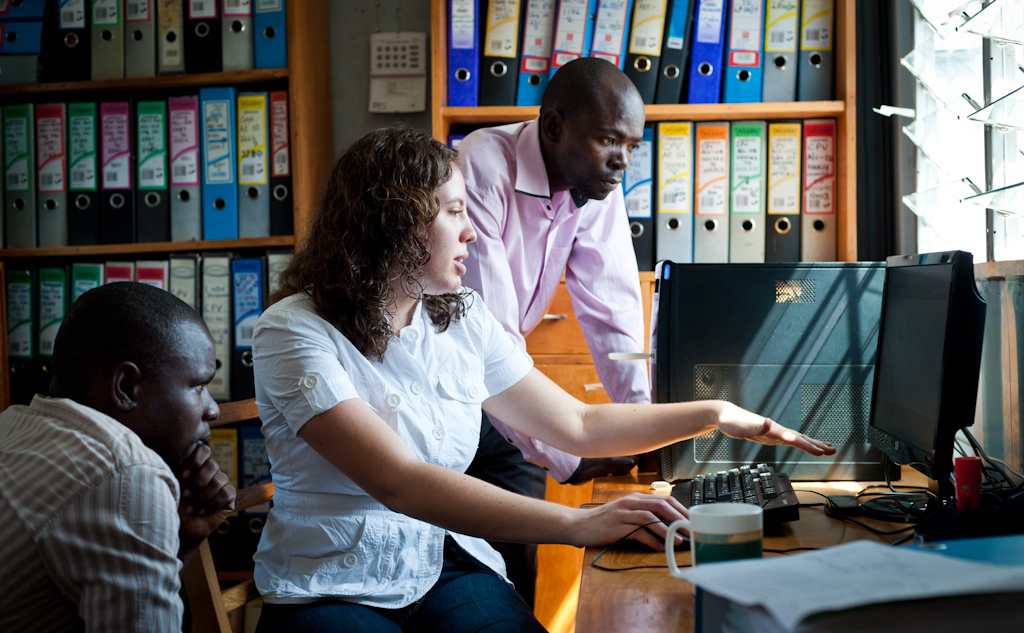
A few weeks ago, the FrontlineSMS:Credit team and FrontlineSMS M&E Intern Juliana embarked on a trip to Kisumu to meet FrontlineSMS users and potential PaymentView users. After an early morning flight, we met Joseph Achola, head teacher at Lake Primary School, and one of the leaders of the local primary school head teachers’ association. Joseph arranged for us to meet head teachers from three local schools to discuss the potential of using PaymentView to enable parents to pay for school fees with mobile money. Schools using PaymentViewwould enable easy management of incoming school fee payments and would allow schools to manage installment payment plans for school fees.
The meeting with the four head teachers was very successful. All were positive about the impact that PaymentView could have on their operations and we scheduled follow-up meetings with Josana Academy and Aga Khan Primary School for Tuesday.
To read more please click here.
PaymentView Now Available in Public Beta!
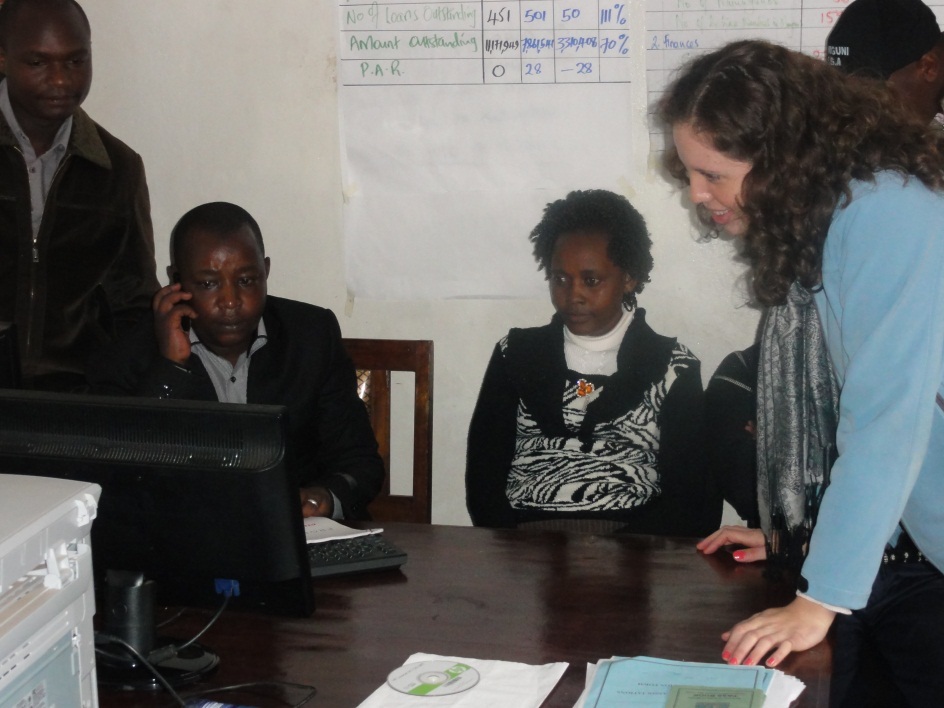 The FrontlineSMS:Credit team is excited to announce that the public beta version of our new software product, PaymentView, is now available for use in Kenya! PaymentView is a mobile money management tool that makes it easy for organizations and businesses serving the base of the pyramid to use mobile money. The software enables any organization – including those in rural areas with limited internet access – to turn a computer plus a USB modem into a hub for using and managing mobile money.
The FrontlineSMS:Credit team is excited to announce that the public beta version of our new software product, PaymentView, is now available for use in Kenya! PaymentView is a mobile money management tool that makes it easy for organizations and businesses serving the base of the pyramid to use mobile money. The software enables any organization – including those in rural areas with limited internet access – to turn a computer plus a USB modem into a hub for using and managing mobile money.
PaymentView is an extension to FrontlineSMS, meaning that as well as new payments functionality it includes all of the benefits of the core SMS communication platform, such as easy communication with staff members or clients and the ability to send reminders and auto-replies. The public beta release version is configured to work with Safaricom’s M-Pesa system in Kenya, and can support any SMS or STK-based payment service with a bit of software development.
The beta version of PaymentView is already being implemented to:
- Enable microfinance borrowers to repay loans via mobile phone to rural microfinance branches
- Expand the availability of an innovative family savings/life insurance product
- Pay salaries for laborers constructing rural renewable energy projects and farm workers
- Help small businesses operate more efficiently
Since FrontlineSMS:Credit's last update, the team have been working to bring on a variety of testers, including an agricultural information provider that is collecting subscription fees for market information services, and a research project that is disbursing financial incentives to intervention assistants.
At present, PaymentView is not a full release but a ‘beta’ release, which means it is in a testing stage of development. We are currently seeking organizations in Kenya that want to partner with us to test the software. You can visit the FrontlineSMS:Credit software page to download PaymentView, and get access to the user guide to help you get started. We are also offering some free user support via the FrontlineSMS user forum; you can sign up for a forum account and join the Mobile Money group to connect with others interested in PaymentView and mobile money. If you have a technical support question, please read through our FAQs first. If you do not find what you are looking for, post your question on the user forum and we will do our best to get back to you as soon as possible, and generally within 24 hours.
This launch is the start of many exciting things to come for FrontlineSMS:Credit. We are continuing work on our next software release, which can support any mobile payment system (with a bit of software development), enabling organizations to adapt PaymentView for use anywhere in the world. Later this year, we’ll be building a more powerful version of the software that will focus on using FrontlineSMS for managing mobile money accounts, airtime accounts, and mobile vouchers all from one interface.
To access the beta of PaymentView software, and to find out more visit FrontlineSMS:Credit's website. If you are based outside of Kenya and wish to use PaymentView, you can join the FrontlineSMS our mailing list to receive updates. We would also love to hear your feedback, bith on the software and our future plans! Send us an email at info@credit.frontlinesms.com to let us know what you think, or to give suggestions for features you’d like to see in future releases.
The FrontlineSMS:Credit Story
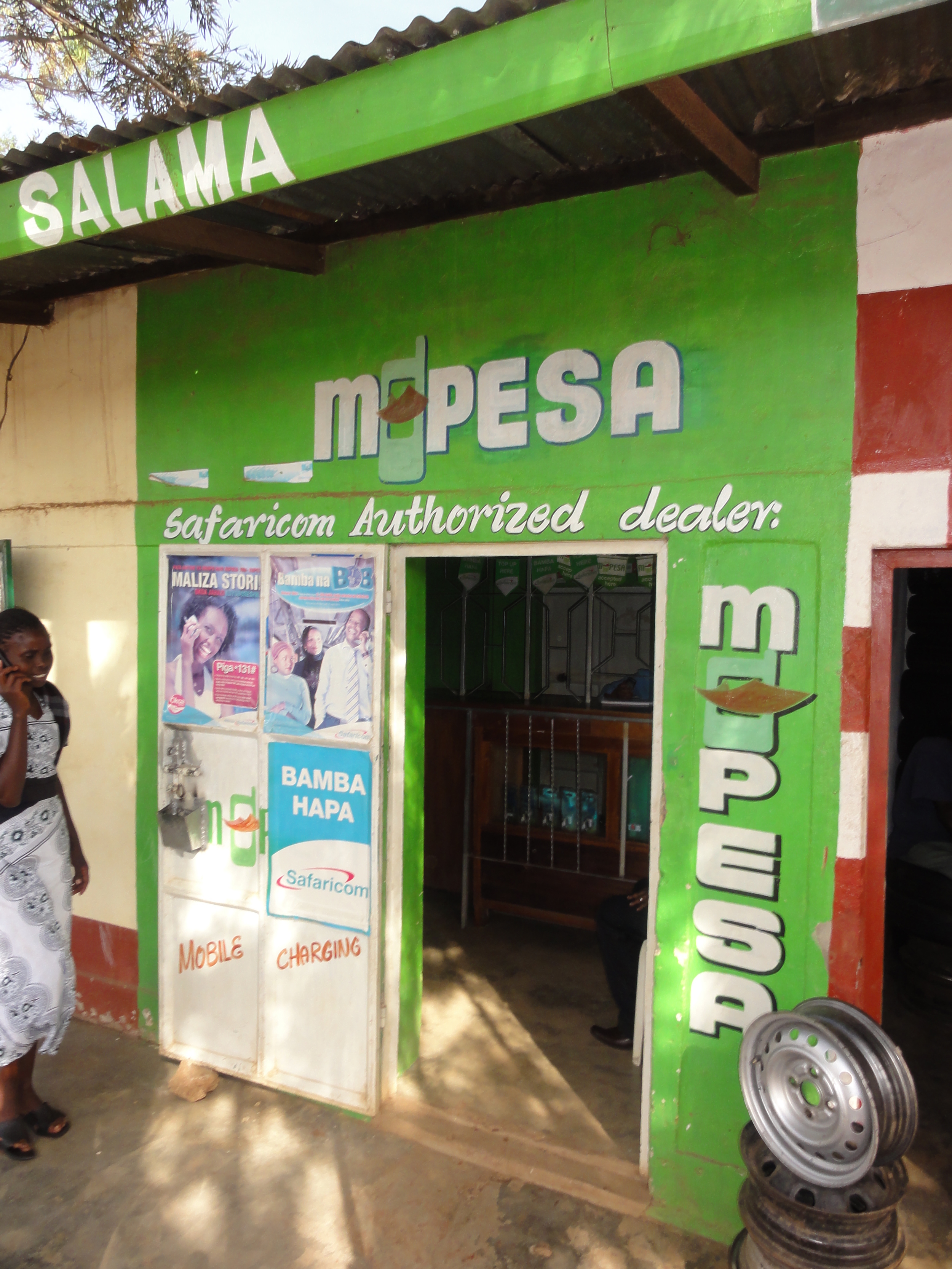 By Sharon Langevin, FrontlineSMS:Credit Project Manager
By Sharon Langevin, FrontlineSMS:Credit Project Manager
Mobile money is spreading quickly across the globe. The ability to transfer funds from a mobile handset has been hailed as the key to extending financial services to the base of the pyramid. While a mobile money account is valuable to an individual for securing savings and easy money transfer, there are many ways that the use of mobile money can create efficiency in the operations of organizations. Through the FrontlineSMS:Credit project, the FrontlineSMS team has been thinking about how to provide a tool that makes it easy for our users to get started using mobile money in their organizations.
FrontlineSMS:Credit is currently preparing for the beta launch of our very first software product, PaymentView, which will be available for public download from early March. PaymentView is an extension to FrontlineSMS that allows the user to send, receive, and manage mobile payments. The software is currently configured for use with M-PESA in Kenya. We are now testing the software with a variety of different organizations, from agribusinesses, to microinsurance providers, to financial services associations. The road from the beginning of FrontlineSMS:Credit to today has been a long one, and not without some setbacks, but we are proud of how far we have come since the project began.
FrontlineSMS:Credit originally started as CreditSMS. The project was instigated by Ben Lyon in 2009, and inspired by the growing potential of mobile technology in Africa, especially mobile money and M-PESA. Ben had the original idea for using FrontlineSMS’s interface as a mobile money management tool, and was able to connect with Josh Nesbit of FrontlineSMS:Medic (now Medic Mobile). When they met, Ben pitched the idea of FrontlineSMS + M-PESA, and Josh said to go for it. Josh provided valuable encouragement for the idea, and Ben started building out the concept under the name CreditSMS. Eventually CreditSMS became a project of FrontlineSMS, called FrontlineSMS:Credit.
In January 2010, Ben met Nathan Wyeth, who would later become the second director of FrontlineSMS:Credit. Nathan was investigating the mobile money sector around the world, and interviewed Ben for a blog post about FrontlineSMS:Credit for NextBillion.net. Soon after, he volunteered to help Ben work on the project. Around the same time, Ben began to develop the very first version of PaymentView with a global network of volunteers. He then applied for, and won, Vodafone’s Wireless Innovation Project competition, which provided the initial funding for PaymentView.
The first pilot of PaymentView took place in Freetown, Sierra Leone, in May 2010 and proved to be a real learning experience. The team quickly gathered that the solution they were offering did not fit the organization they were partnering with. PaymentView allowed the user to both send and receive payments, even though the partner MFI had only asked for the ability to accept loan repayments. In addition, PaymentView linked to a different MIS than the one the partner MFI was using, and the difference between the two was not trivial. The challenges of the pilot helped to inform the further development of our software, our approach to selecting and working with partner organizations, and most importantly, our ability to design appropriate projects.
After the pilot ended, Ben headed to Boulder, CO to attend the very first Unreasonable Institute, an accelerator for social entrepreneurs. He met other talented and driven social innovators and connected with advisors and investors. He worked on FrontlineSMS:Credit all summer, further developing the idea and making plans for future expansion, which led to his Pop!Tech Fellowship in the fall of 2010 and significant press attention for the project.
Through his experience at Unreasonable Institute, Ben made the decision to hand over FrontlineSMS:Credit to Nathan and move on to a new position, as founder of a company called Kopo Kopo, where he is now the Vice President of Business Development. He says he is grateful for his time at FrontlineSMS because it helped to shape his career path and taught him how to lead a successful project.
Nathan took over fully by late fall 2011, and moved the project to Nairobi, Kenya, one of the epicenters of mobile money, where he planned to build a user community before expanding the project internationally. (Side note: Funny enough, Nathan and Ben lived together and worked in the same co-working space, the iHub, for several months during 2011).
Nathan hired new developers and began building the version of PaymentView we’ll soon be releasing. Nathan re-thought the role that PaymentView could play in the Kenyan context and began building the software based on some of the lessons of the original pilot, but strongly tailoring the software for the growing community of potential users in Kenya. By June, the staff began to expand with three summer fellows and me, the new FrontlineSMS:Credit Operations Manager.
Over the next few months, the summer fellows delved into a variety of sectors to learn more about how mobile money could be used, and I worked on securing beta users for the PaymentView software we have been building. We interviewed potential users in agriculture, financial services, and health to find out how mobile payments could increase efficiency and cut costs. We found that the possibilities were endless; from enabling loan repayments to be made remotely, to distributing payments for farmers’ crops without the farmers having to meet at a central point, to paying community health workers’ salaries with mobile money. Mobile money allows organizations to provide better services to their clients and save on operating costs. Some of the savings groups we are working with have reduced travel time for repayments from a full day to under an hour, and cut the cost of the transaction in half.
Fast forward a few months, and we’re ready to release the PaymentView beta into the world for live testing. The FrontlineSMS:Credit team is now moving full steam ahead, building on the foundation that Nathan built over the last year (Nathan has since moved on, and I’ve taken over as Project Manager). We are hard at work expanding our user base and adding USSD support to PaymentView so that a developer anywhere will be able to build an integration into any mobile money system in the world (currently we can only support SMS and STK-based systems).
We are currently seeking testers in Kenya who are willing to use the software and provide feedback to us. If you are interested in helping us to test the software, please contact the FrontlineSMS:Credit team for more information. If you are based outside of Kenya and want to learn more or be notified when we the international version is ready for testing, please visit our website and join our mailing list to stay updated.
Making Mobile Money More Inclusive
 FrontlineSMS:Credit is a sister project of FrontlineSMS, which aims to make every formal financial service available to the entrepreneurial poor in 160 characters or less.
FrontlineSMS:Credit is a sister project of FrontlineSMS, which aims to make every formal financial service available to the entrepreneurial poor in 160 characters or less.
Recently, FrontlineSMS:Credit re-launched their website, where you can find out more about their work. The FrontlineSMS:Credit team have also taken on two Social Impact Fellows to research new opportunities for enterprise use of mobile payments, and the accessibility of mobile payments in East Africa. They will be sharing their findings on the FrontlineSMS:Credit blog over the summer.
Here, Nathan Wyeth, FrontlineSMS:Credit Project Director, shares some of his own ideas on how to make mobile money inclusive.
"During a recent trip to Washington, DC, I met with a range of people working with NGOs and private organizations interested in mobile money in various forms. I spoke with them about applications of FrontlineSMS software to make it easier for development programs to use mobile money; both for work with beneficiaries as well as for internal administration. But one of the most interesting questions I got was: How can mobile money systems be designed to be more financially inclusive, and what would a financial inclusion 'wish list' look like for mobile money platforms? I spoke with my colleagues in Nairobi about this, and identified the below ideas.
1. If bank involvement is required, enable agency banking and keep requirements realistic for rural areas.
If bank involvement is required, agency banking contracted to mobile money operators, combined with KYC requirements that are realistic for rural areas, can keep mobile money systems accessible. Requirements like photocopies of ID cards do little if anything to promote security of the banking system and simply create a serious barrier to rural customers.
2. Encourage mobile money for commerce by creating small businesses accounts.
In many cases nothing exists between personal accounts and corporate accounts for bill payment and the like. This means that small and medium enterprises will accept mobile payments, but to personal accounts of employees and within the transaction limits set for individual users. While mobile money can easily be a tool for improved financial and business management and customer interaction, paying to personal accounts creates headaches at best and opportunities for fraud, theft and customer mistrust at worst.
A small business account would be an easy thing for mobile payment operators to create. This could include features like:
- Opened in the name of the business by the owner or authorized agent
- Higher daily account limits – for example, to pay salaries – with option for account owner to set custom limits below this to prevent fraud/theft.
- Retrieve account history via SMS for security and financial management
3. Make it easy to get an enterprise connection to a mobile money account.
It is not enough to make it possible for urban, sophisticated banks and corporations to build real-time, web-based connections to payment systems so that they can handle transactions at volume. Account updates should be easy to obtain via web and SMS and in formats (APIs, etc.) that make it possible for any organization using payments at volume that do have their own electronic recordkeeping to bring this data directly into such systems.
4. Ensure that mobile payments conform to financial industry standards
Employing industry-wide standards will hasten the adoption of mobile money alongside the existing architecture of the financial industry and increase the comfort that regulators have with this new form of money transfer. This includes standardized data format methods for enterprise connections (ISO 8583) and data security standards in line with those used by payment cards (PSI-DSS).
Read more on making mobile money inclusive in the full version of this post on FrontlineSMS:Credit's blog.
When it's reasonable to be Unreasonable
One of the most exciting things about my work is the incredibly talented people I get to meet. Up-and-coming entrepreneurs with a never-say-die, get-up-and-go attitude. I'm continually inspired and more than happy to offer my help in any way I can, particularly to those looking to implement FrontlineSMS one way or another in their work. Today, two of these projects have made it through to the next round of a major competition and are looking for your help. I hope you feel equally inspired to show your support - it's only a few mouse clicks away and costs little. What's it all about?
The Unreasonable Institute unites up to 25 high-impact social entrepreneurs from around the world, who attend an intensive 10-week summer institute. There, entrepreneurs incubate their ventures with rigorous skills training and expert mentorship. At the end of the ten weeks, the Institute connects the Fellows with start-up capital and a global network of support. In short, the opportunity provided by the Institute will make a significant contribution to the growth of these early-stage initiatives.
Finalist #1: FrontlineSMS:Credit
FrontlineSMS:Credit, run by Ben Lyon, is one of the finalists. FrontlineSMS:Credit aims to make every formal financial service available to the entrepreneurial poor in 160 characters or less. By meshing the functionality of FrontlineSMS with local mobile payment systems, implementing institutions will be able to provide a full range of customizable services, from savings and credit to insurance and payroll. Ben is currently in Sierra Leone testing his system, and signing up local organisations for early pilots. Visit Ben's page on the competition website and support his pioneering work!
Finalist #2: Light Up Malawi
Light Up Malawi - run byRaina Kumra - is a venture which aims to bring 100% alternative energy to Malawi through policy reform and the creation of a sanctioned pilot program for all manufacturers of solar, biomass, and wind energy products. In a sign that collaboration is alive and well even among competition finalists, one of the key systems they plan to deploy is FrontlineSMS:Credit, which will be used to assist with the setting up of rural distribution programs, and allow for the creation of finance systems for village entrepreneus. Please show your support for Raina's work by visiting her competition page here.
Both projects need pledges of just $10 from 650 individuals. The first 25 projects from the 37 finalists to raise $6,500 will secure their place on the summer program. Please take a moment to show your support. You pledge now and pay later, and it only takes a minute. Thank you!
(You can read more about how the Unreasonable Marketplace works here).








